Making MaRDI Gallery
You want to know who is making MaRDI and what motivates them? Here we introduce you to the people who shape MaRDI with their expertise and vision for mathematical research data.
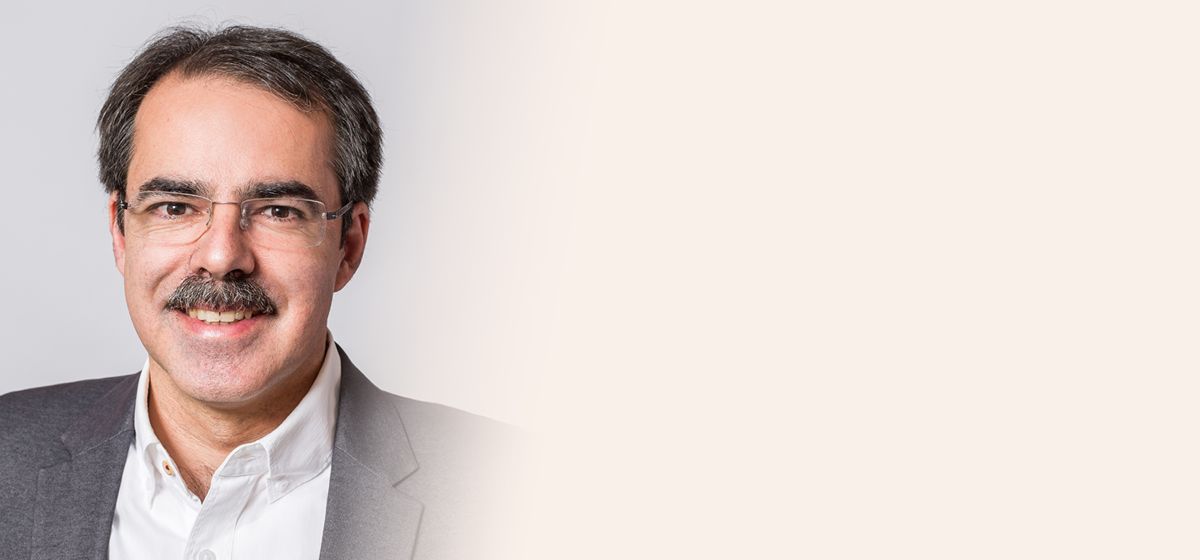
Speaker of MaRDI
Who are you in two sentences?
I think my ORCiD (0000-0001-9471-2479) best describes me as a scientist.
In which field of mathematics do you work and how long have you been working there?
I have been working mostly, close to 25 years now, in optimisation.
What is the most important problem in your field that MaRDI aims to solve?
There are lots of community traditions when it comes to the implementation, testing and description of algorithms, especially on input and output data. In my view, MaRDI tries to bring a structured approach to this that would include more of the mathematical community and extending this culture to a wider circle.
What's your expertise within MaRDI?
MaRDI would best answer questions on design and implementation of algorithms in problems relating to continued optimisation and associated data requirements. Connecting our services to possible and potential applications like imaging science for example is what I would describe my expertise in MaRDI to be.
How do you wish the data culture to change with the help of MaRDI?
I would like to see the current data culture moving away from individual communication, from supervisor to student, to one that is much broader. Ideally it would be a part of the education of students and would reach a certain standard on wider scale.
How would you describe a typical work day?
To put it simply: there are lots of input data, scheduling and lots of output data, ranging from administration to core science.
What is an aspect of your work that you particularly enjoy and what is one that you find challenging?
I enjoy both communicating and carrying out joint research with the community.
The biggest challenge would be to establish a long lasting project environment that would benefit research and education and advance the scientific area. This includes for eg. driving forward 3rd party funds and establishing good structures for longer periods.
January 23, 2024, Photo: © Verena Brandt
TA7: Governance and Consortium Management
WIAS Berlin
Do you have a favourite place you go to for thinking about a problem?
It used to be running. It gave me time to contemplate on the issue or problem at hand and come up with a solution or to the realisation of why a proof doesn't work. While the latter is not an ideal result, it still does help the progression of science.
What do you enjoy outside work?
I do enjoy music and with what time I do have, I try to play some tunes on the electric guitar.

Cooperation with Other Disciplines
Who are you in two sentences?
Even though I am originally a trained physicist specialized in molecular physics and computational quantum dynamics, I spent many years in academic research institutes for theoretical chemistry and for applied mathematics. In addition to my daily computational work and occasional university teaching, I also see myself as an interpreter between the languages of physicists, chemists, and mathematicians.
In which field of mathematics do you work and how long have you been working there?
As I am not a "real mathematician", my work is highly interdisciplinary merging elements from physics and chemistry, but almost always also involving applied or numerical mathematics to some extent. For more than 30 years, my activities were mainly centered around mathematical modeling and computer simulations of molecular processes, before I joined the WIAS in Berlin and started working on MaRDI in October 2022.
What is the most important problem in your field that MaRDI aims to solve?
For me, the work on MaRDI is not only research data managment according to the FAIR principles, but also organizing, structuring, and sharing knowledge. MaRDI essentially aims to solve that important problem by means of ontologies and knowledge graphs. In addition, the MaRDI team also works on standardization and documentation of workflows, as well as on algorithms, both for symbolic and numerical computing.
What's your expertise within MaRDI?
Already during my previous work in molecular physics, I have invested quite some time and effort in developing the general purpose WavePacket and WaveTrain software packages for quantum dynamics which are available through SourceForge or GitHub, respectively. Being well documented with a plethora of demonstration examples, these packages were already rather close to comply with the FAIR principles, even long before the general awareness for that has arisen in the context of NFDI and other initiatives.
In my recent work, I am mainly concerned with developing an ontology of mathematical models. Along with learning semantic web languages such as RDF, OWL, SPARQL, etc., this is a new and interesting challenge for me. On the one hand, the design of the knowledge graph has to be flexible enough to represent even complex modeling scenarios. On the other hand, it has to be simple enough to become generally accepted within the community.
In addition to setting up classes, properties and relations defining the structure for the ontology of mathematical models, I am also working on populating the knowledge graph with specific examples of mathematical models, mainly from the natural sciences. Even though the envisaged goal of the first 100 models is still far ahead, the experience from my previous interdisciplinary work in physics and chemistry turns out to be very helpful.
How do you wish the data culture to change with the help of MaRDI?
By applying the FAIR principles not only to research data, but also to knowledge representations, an important short-term goal of MaRDI will be to set up a common knowledge graph for all the task areas within MaRDI, to be easily accessed through the common MaRDI web portal. On a longer time scales, joining efforts with consortia from other disciplines could be very helpful for finding a common language and for initiating overarching activities. A first step in that direction was a workshop organized by myself together with the MaRDI colleagues at WIAS where we invited participants from all the 25 NFDI consortia present in the Berlin-Brandenburg region.
How would you describe a typical work day?
Ideally, I am trying to balance my time and energy between two types of activities: On the one hand, meetings and conversations with colleagues are very important, both on-site and via online conference tools. On the other hand, concentrated silent work such as programming and running simulations are indispensable for my work. Yet another important ingredient of a typical work day is going for lunch with my colleagues, enjoying conversation about science-related or completely different topics.
What is an aspect of your work that you particularly enjoy and what is one that you find challenging?
An aspect that I particularly like about my work is learning new things. This can be on a technical level, e.g., learning computer languages or numerical recipes, or it can be on a conceptual level such as learning about ontologies and knowledge graphs.
A challenging aspect of my work is staying in contact with my colleagues. Since the MaRDI project is spread all over Germany, and also with working from home becoming more and more popular, there is always the risk of losing contact to each other, despite the availability of online meetings.
January 16, 2024
TA4: Cooperation with Other Disciplines
WIAS Berlin
burkhard.schmidt@wias-berlin.de
Do you have a favorite place you go to for thinking about a problem?
Just sitting at my desk in my office is not always the best place for thinking. Often times, my colleagues see me walking along the corridor or the stair case of the WIAS when I get stuck in solving difficult problems. Of course, a walk or a bike ride are doing even better ...
What do you enjoy outside work?
In my free time, I like to go on longer bike rides, either to the hilly Fläming region south of Berlin, or along the major rivers (Havel, Elbe, Oder) of the Berlin-Brandenburg region. At night time, I love to explore the vibrant cultural life of Berlin, in particular the fantastic Jazz clubs.
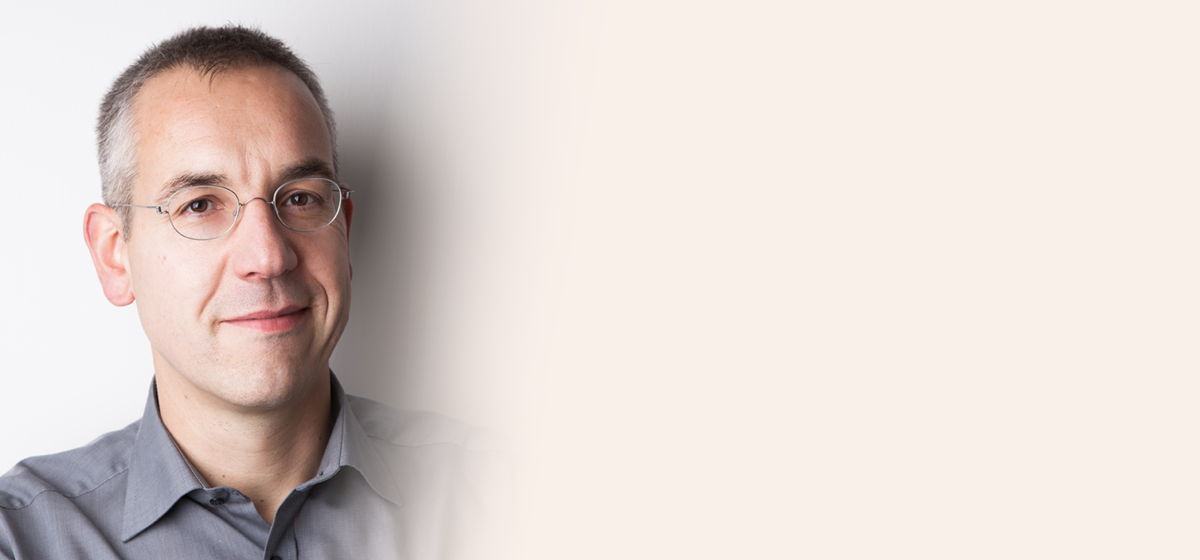
Computer Algebra
Who are you in two sentences?
I am a mathematician with a strong interest in computation and software.
In which field of mathematics do you work and how long have you been working there?
Mostly polyhedral geometry (since 1996), tropical geometry (since 2003), optimization (hard to say when this started), and computer algebra. My interest in computer algebra started in high school, even if at that time I did not know that this was the name for this topic. In fact, that interest was a main reason for me to study mathematics in the first place.
What is the most important problem in your field that MaRDI aims to solve?
There are several. To pick just one: developing a FAIR file format for storing and exchanging data in computer algebra.
What's your expertise within MaRDI?
I have wide and detailed knowledge on how to organize exact computations in mathematics.
How do you wish the data culture to change with the help of MaRDI?
I envision a perfect blend between traditional ways of doing and publishing mathematics with computations. Here formal proofs will play a role in the (near) future, but this does not suffice by itself. To fully exploit the power of computers to do mathematics, we also need to make use of numerical methods and computer algebra, even in cases where a full certification is not feasible.
How would you describe a typical work day?
This varies a lot. Reading and writing email, reading and writing reports are probably the only fixed points.
What is an aspect of your work that you particularly enjoy and what is one that you find challenging?
I enjoy inspiring discussions with students and other researchers about mathematics and computation. I also like programming; often this is how I get acquainted with some math which is new to me. I dislike too much email and reporting routine, administrative work in general.
December 18, 2023
TA1: Computer Algebra
TU Berlin and Max Planck Institute for Mathematics in the Sciences (MPI MIS), Leipzig
Do you have a favorite place you go to for thinking about a problem?
No, not really. I like swapping a math problem into my head whenever I have the time to think about something interesting. The best thing about math, as I see it, is that one can think about it almost always and almost everywhere.
What do you enjoy outside work?
Cycling, swimming, skiing, hiking. Photography.

Cooperation with Other Disciplines
Who are you in two sentences?
I'm a computer scientist by training, with a penchant for philosophy, working as a data/information/knowledge engineer.
In which field of mathematics do you work and how long have you been working there?
As I'm not a mathematician, I'll list my research experience for my fields: Starting with the core computer science disciplines of distributed systems and databases, my interests have shifted towards data/knowledge engineering and research data management. There, I work on metadata, semantics and ontologies as well as dark data for over 8 years now, starting when this was not quite an issue (at least in computational engineering and simulation), giving me the opportunity to help shape this area at least a bit. Besides that, my research interests include philosophy of science and technology, and the relation of information technology and society.
What's your expertise within MaRDI?
I'd describe my expertise in MaRDI as the experience in general research data management, metadata/ontology-design and analyzing the requirements of the specific community.
How do you wish the data culture to change with the help of MaRDI?
I would like to see that research data management is envisioned as a crucial part of the research process itself. More specifically, I hope that STEM researchers (and beyond) document the scientific underpinnings of their research works, e.g. what knowledge claims are made, where they come from, why they are valid and why they should be accepted (i.e. their epistemic grounding).
How would you describe a typical work day?
There is no typical work day.
What is an aspect of your work that you particularly enjoy and what is one that you find challenging?
I really enjoy working in mathematics as a fundamental science. On the one hand because I learn a lot of new things and on the other hand because I see how many applications are based on which mathematical principles. And of course, understanding these principles can be challenging.
September 05, 2023, Photo: © Thomas Bernhardt
TA4: Cooperation with Other Disciplines
University of Stuttgart
bjoern.schembera@mathematik.uni-stuttgart.de
Do you have a favorite place you go to for thinking about a problem?
Usually somewhere in the nature, and especially after the activities listed below my mind is free again.
What do you enjoy outside work?
Music, may it be live on concerts or festivals, digital or analog on vinyl (I maintain well-data-managed music collections :)). Moreover, I do a lot of cycling.
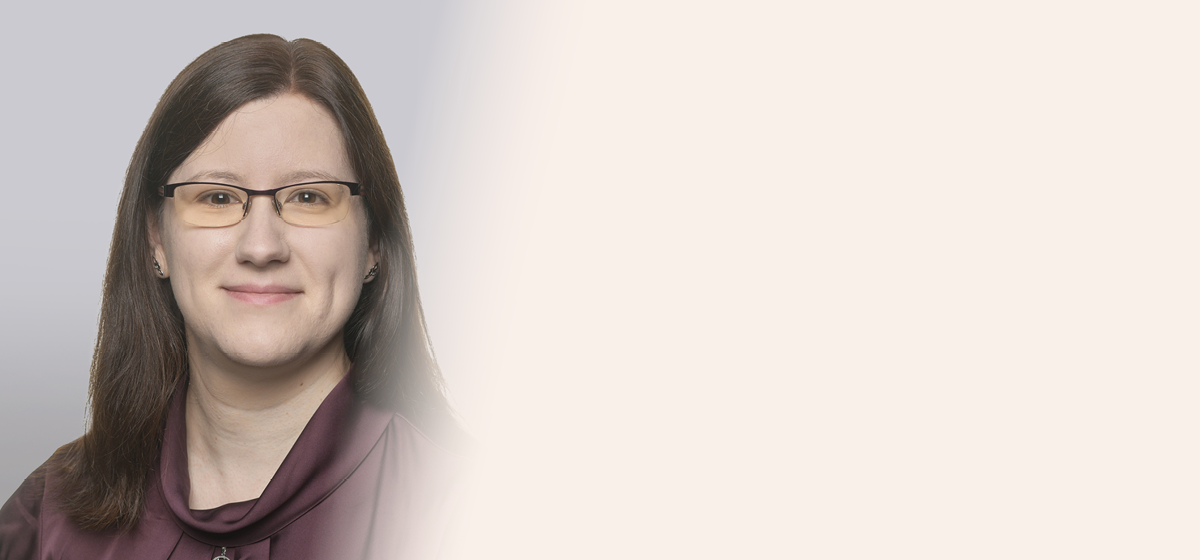
Cooperation with Other Disciplines
Who are you in two sentences?
I am Christine, I am working at the Fraunhofer Institute for Industrial Mathematics (ITWM) in Kaiserslautern in the division „Mathematics for Vehicle Engineering“. Within MaRDI, I am a member of the interdisciplinary task area 4 "Collaboration with other disciplines".
In which field of mathematics do you work and how long have you been working there?
My main field is modeling and simulation. My doctoral thesis dealt with usage modeling for automotive applications, which includes statistics and geographic data. Now, I incorporate the methods in projects focusing on topics like durability or energy efficiency. This includes the evaluation of different data like simulations, measurements and statistics, as well as parameter fitting, among others.
What is the most important problem in your field that MaRDI aims to solve?
In my daily work, I deal with complex application problems that usually cannot be assigned to a single field of mathematics. Almost every project involves a new aspect that must be taken into account. The algorithms used so far have to be adapted or new ones have to be sought. Hereby, the structure of the available data is important, less its subject or source. If more metadata and information on methods is published, my research will be facilitated and reusability and interoperability will be improved, especially across different disciplines.
What's your expertise within MaRDI?
I work on application problems where the solution is in the foreground. I do not concentrate on a particular field of mathematics and sometimes adopt algorithms that initially have not been developed for the application for which I use them. Thus, I can contribute the view of a person who is searching for models or algorithms and who wants to use the services and tools we are developing within MaRDI. I also bring in experience in interacting with partners outside of mathematics, which helps when communication with other NFDI consortia.
How do you wish the data culture to change with the help of MaRDI?
I hope that MaRDI helps to improve the (re-)usability of all kinds of data. Due to incomplete references or missing information how data was preprocessed, it is sometimes challenging to get the underlying data of a report or paper and to carry out own evaluations. If the FAIR principles are considered more carefully, data sets can be reused more easily. I wish that the data culture changes in the direction that people see the overall benefit and not only the additional effort.
How would you describe a typical work day?
A typical working day can look very different, depending on the status of the projects I am currently working on. It includes setting up, programming and parametrizing models, as well as the associated data research. In addition, simulations have to be started and evaluated with different software, and the results have to be summarized. I also create presentations, write reports and participate in various meetings. Exchanging ideas and discussing with colleagues also has a high priority.
What is an aspect of your work that you particularly enjoy and what is one that you find challenging?
I enjoy that I help to solve problems from application with mathematical concepts. We use a wide variety of methods to make cars safer and more durable while saving money during development and energy along the route traveled. My work deals with a balanced mix of known and new problems. The development of an ontology for mathematical models within our task area in MaRDI is for instance a new and interesting topic for me. It is challenging to meet the requirements and at the same time ensure usability. On the one hand, it has to be possible to represent complex mathematical concepts from all fields in our Knowledge Graph; on the other hand, it must be easy to understand and simple to use. Otherwise, people will disregard it.
August 08, 2023, Photo: © Gesa Ermel/ITWM
TA4: Cooperation with Other Disciplines
ITWM Kaiserslautern
christine.biedinger@itwm.fraunhofer.de
Do you have a favorite place you go to for thinking about a problem?
I do not have a special place to think. It often helps me to take a break and occupy myself with something completely different. That can simply be the housework, for instance. Discussions with colleagues also often provide new impulses.
What do you enjoy outside work?
I like the mix of being active and relaxing. I do ballroom dancing with my partner, but I also like to stay at home with a good book. I enjoy baking and gardening and I am creative in crafting with different materials.

Scientific Computing
Who are you in two sentences?
I am a professor in applied mathematics at the University of Münster and currently one of the spokespersons of the cluster of excellence “Mathematics Münster: Dynamics – Geometry – Structure”. Together with Peter Benner from MPI-DCTS Magdeburg, I am responsible for the task area “Scientific Computing” in MaRDI.
In which field of mathematics do you work and how long have you been working there?
My research area is numerical analysis for partial differential equations with a particular focus on error control and adaptivity, model order reduction, numerical multi-scale methods, software development and scientific computing.
What is the most important problem in your field that MaRDI aims to solve?
A major challenge in scientific computing is reproducibility and transparency of research results. Researchers often work with complex algorithms, large datasets, and custom code, making it difficult for others to reproduce their findings or to interoperate with existing software. Typical issues are lack of standardization, inadequate documentation, and limited sharing of code and data. Addressing these challenges and promoting a culture of open and reproducible research in scientific computing is crucial for advancing scientific knowledge and fostering collaboration.
What question can you answer best regarding MaRDI/ What's your expertise within MaRDI?
Within MaRDI we focus on the development of services for the scientific computing community. In particular, we are currently establishing a knowledge graph of numerical algorithms that is interlinked with corresponding publications, software packages and problems to be solved (see https://algodata.mardi4nfdi.de/ ). For seamless interconnection of corresponding software, we also work on standardization of open interfaces in scientific computing.
How do you wish the data culture to change with the help of MaRDI?
The data culture should be FAIR. To achieve this ambitious goal, awareness and recognition of the additional efforts in this direction must be increased.
How would you describe a typical work day?
While teaching, a typical workday for me consists of many meetings, some lectures, and when the day ends, I start preparing the next day's sessions. Fortunately, the situation is better outside of teaching period, as there is more time for research and thinking about new approaches.
What is an aspect of your work that you particularly enjoy and what is one that you find challenging?
I particular like working and discussing with students individually. I enjoy discussions on challenging mathematical problems. Working with enthusiastic and smart people is simply great.
July 25, 2023, Photo: © WWU - Peter Leßmann
TA2: Scientific Computing
University of Münster
+49 251 83 33775
mario.ohlberger@uni-muenster.de
Do you have a favorite place you go to for thinking about a problem?
No, problems are always there and the only thing that I need is time to process them.
What do you enjoy outside work?
I enjoy running around the city lake “Aasee” in Münster and letting my thoughts run freely.

Statistics and Machine Learning
Who are you in two sentences?
I am Sebastian, a PhD student at the chair for statistical learning and data science at LMU munich. One of the main projects that I am working on is the mlr3 machine learning framework in R.
In which field of mathematics do you work and how long have you been working there?
I have been working in the field of statistics and machine learning since late 2021.
What is the most important problem in your field that MaRDI aims to solve?
A major problem in the field of machine learning is that many methods are proposed that allegedly improve the state of the art. However, such improvements are not always reproducible. By providing better benchmarks and guidelines, I hope that this problem can be at least mitigated.
What's your expertise within MaRDI?
My expertise lies in the benchmarking of machine learning algorithms and the development of R packages.
How do you wish the data culture to change with the help of MaRDI?
I hope that high quality research data (including software), and also the people who develop it will be valued more in the scientific community.
How would you describe a typical work day?
It is a mix of software engineering, reading scientific articles and Zoom meetings.
What is an aspect of your work that you particularly enjoy and what is one that you find challenging?
I really enjoy working and learning from very competent people.
A big challenge for me is that there is an infinite amount of things that can be done, but there are only so many hours in a day.
Being able to rigorously figure out what is most important and focusing 100% on that is something that I have yet to learn.
July 11, 2023, Photo: private
TA3: Statistics and Machine Learning
LMU Munich
sebastian.fischer@stat.uni-muenchen.de
Do you have a favorite place you go to for thinking about a problem?
Sometimes I like to think about problems while running.
What do you enjoy outside work?
I like wildlife photography, hiking, running, meditation and most importantly, eating Indian food.
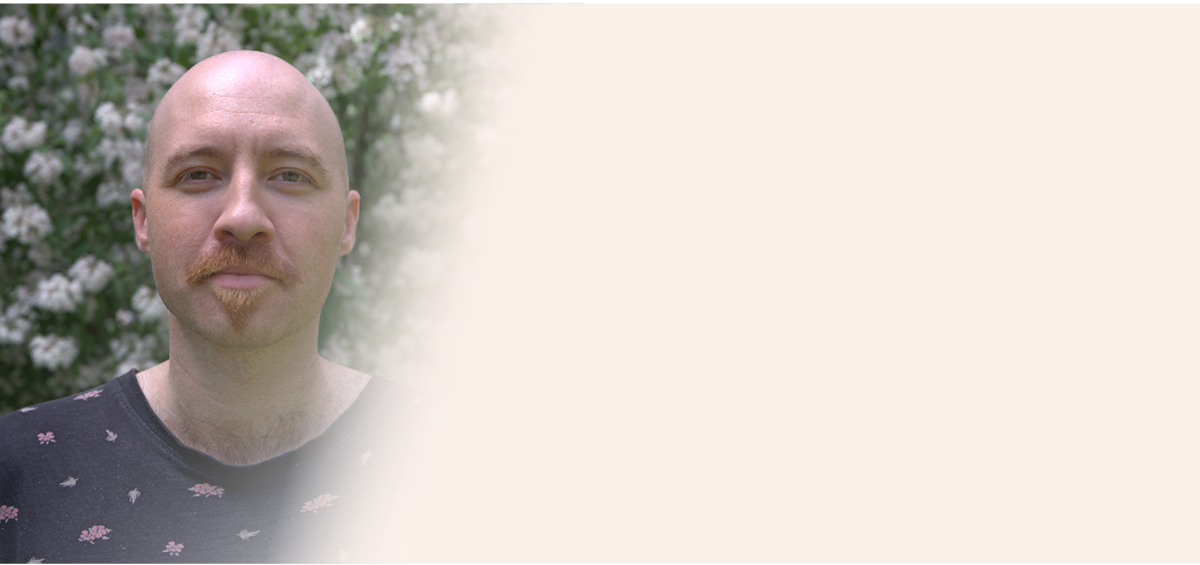
Computer Algebra
Who are you in two sentences?
I am a software developer with a background in mathematics. After spending some time working in industry I am happy to return to academia and specifically mathematics.
In which field of mathematics do you work and how long have you been working there?
During my MSc I was working in geometric group theory. I wrote software to generate examples of one relator groups and check some of their properties. I have recently returned to academia, and I have spent the last year working in the Discrete Mathematics and Geometry group of Michael Joswig.
What is the most important problem in your field that MaRDI aims to solve?
I think mathematicians working in computer algebra can struggle with reproducibility and interoperability. Since there isn't a standardized way of storing computer algebra data one often has to rerun the entire experiment. This comes with the issue of software maintenance as opposed to just data maintenance. The larger the gap between the time the experiment was originally run and the moment the results should be reproduced the more difficult it is for the results to be reproduced. A large contributor to this difficulty is due to software updates and interoperability between changing software versions.
What question can you answer best regarding MaRDI/ What's your expertise within MaRDI?
My focus is on computer algebra data. I am currently working on an extendable data format that aims to serialize many of the mathematical objects found in computer algebra. Such a format would make maintaining data and creating databases possible, and efficient.
How do you wish the data culture to change with the help of MaRDI?
I would like to see a wider acceptance of mathematical software amongst the mathematics community. I would also like to see a more robust software infrastructure amongst the academics already using mathematical software.
How would you describe a typical work day?
I spend most days working with the OSCAR software system. Sometimes I work on Polymake. I also lend a hand when colleagues have software issues.
What is an aspect of your work that you particularly enjoy and what is one that you find challenging?
I enjoy getting to learn new things every week and to work with and meet many interesting people.
It can be challenging sometimes to figure out which problem is of a greater importance and should be prioritised, or to decide if a particular problem will require too much effort and is not worth the time at the moment.
June 13, 2023, Photo: private
TA1: Computer Algebra
Technische Universität, Berlin
Do you have a favorite place you go to for thinking about a problem?
Maybe not the most creative response, the office. When thinking about a problem I believe bouncing ideas off of colleagues, or getting distracted for a moment with a colleague's problem can often shed new light on the problem I am currently working on.
What do you enjoy outside work?
Art in all shapes and forms. I personally play many instruments, and compose music. I also enjoy writing code that generates art, and reading, mainly science fiction.
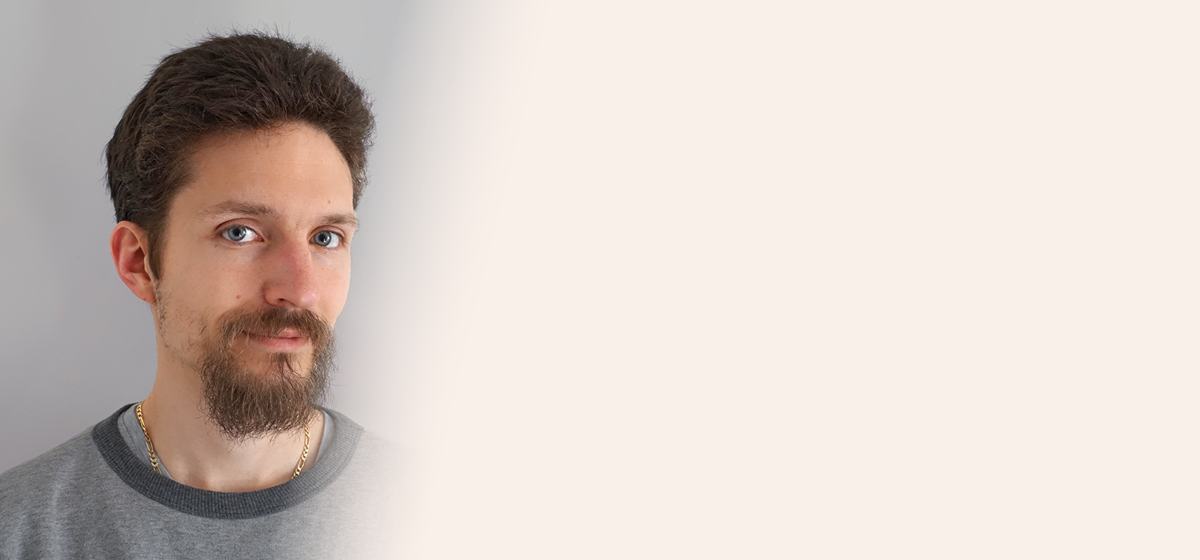
Cooperation with Other Disciplines
Who are you in two sentences?
I am a trained biotechnology and process engineer turned bioinformatician who is used to working in interdisciplinary teams and projects. In the MaRDI consortium I am part of task area 4 "Collaboration with other disciplines" and deal with the documentation of interdisciplinary workflows.
In which field of mathematics do you work and how long have you been working there?
Interdisciplinary, for almost ten years I have been applying and developing mathematical models to answer questions in physics, chemistry and medicine.
What is the most important problem in your field that MaRDI aims to solve?
Reproducibility is a crucial factor in research. Anyone who has ever meticulously worked through a scientific article only to end up with a different result knows how energy- and time-consuming this can be. This is where MaRDI comes in, by giving researchers simple technologies to help them improve the reproducibility of their work.
What's your expertise within MaRDI?
Because of my somewhat different studies and experience in various interdisciplinary projects, I may have a different perspective on certain things that could be helpful when communicating and collaborating with consortia from other disciplines.
How do you wish the data culture to change with the help of MaRDI?
We should strive for a FAIR research data culture, where not only the publication of articles is worth something. I would like to see MaRDI bring this transformation process to all levels, from the ordinary scientist to the journals and funders to the legislators.
How would you describe a typical work day?
This is very different. Sometimes there are many meetings and conversations, sometimes it's just programming. Only the coffee is always there.
What is an aspect of your work that you particularly enjoy and what is one that you find challenging?
I like learning new things. My tasks at MaRDI open up completely new scientific fields with interesting questions that I would never have come into contact with myself.
Since the project is spread all over Germany, you can sometimes lose sight of each other despite the many long-distance meetings.
May 23, 2023, Photo: private
TA4: Cooperation with Other Disciplines
Zuse Institute Berlin
Do you have a favorite place you go to for thinking about a problem?
A walk through one of the parks nearby is always a good option.
What do you enjoy outside work?
I've been watching my daughter discover the world for a few months now. When I'm not doing that, I'm bouldering, because there's nothing more motivating than finally mastering a route after many failures.

Governance and Consortium Management
Who are you in two sentences?
A biologist turned Scientific Co-ordinator for MaRDI. I am still a mosquito, and other winged insects, enthusiast at heart.
In which field of mathematics do you work and how long have you been working there?
I don't work in any particular mathematical field but I was in research from 2002 - 2021.
What question can you answer best regarding MaRDI/ What's your expertise within MaRDI?
I see how MaRDI works as a whole, with the various cogs working and clicking together. I also see the niche that MaRDI has within the NFDI.
How do you wish the data culture to change with the help of MaRDI?
I would hope that the services that MaRDI provides will help researchers see data as more than the classical definition or interpretation; that it could include software, programmes and any thing that would enable others to build on what is available.
How would you describe a typical work day?
A typical day is where I come in with a list of things to get done but don't because issues crop up during the day that take priority. :)
A typical work week sees me in meetings, answering requests that are coming in from within MaRDI, the NFDI and the DFG and preparing material for the MaRDI steering committee meeting. Doesn't sound like much when I write it like this!
What is an aspect of your work that you particularly enjoy and what is one that you find challenging?
I enjoy engaging on the consortial level, meeting with other co-ordinators and representatives, exchanging ideas and information.
Language can sometimes be challenging as I understand German better than I can speak it but I think people are used to that and don't bat an eyelid when I start my answer in German and gradually shift to English.
May 09, 2023, Photo: © Verena Brandt
TA7: Governance and Consortium Management
WIAS Berlin
Do you have a favorite place you go to for thinking about a problem?
I like to go for a brisk walk in the park. The fresh air, moving and the change of scenery helps.
What do you enjoy outside work?
I like anything to do with food: baking, cooking and the eating of course.
Otherwise the usual listening (and singing along very badly) to music and reading.
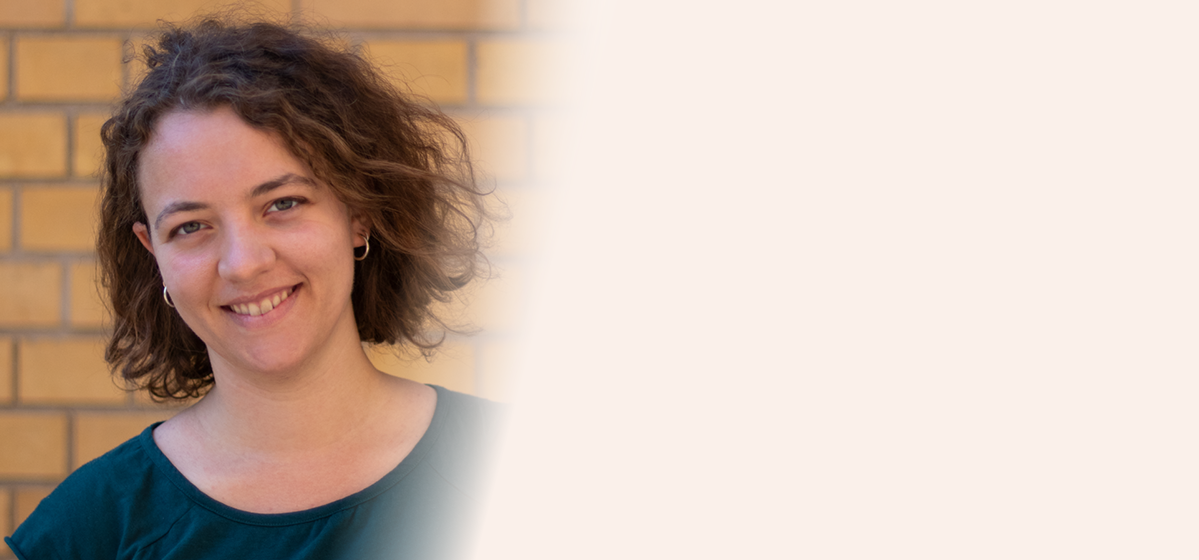
Data Culture and Community Integration
Who are you in two sentences?
My name is Tabea Krause and I studied both mathematics and logic in Leipzig. Working for MaRDI helped me realize that I wanted to become a researcher myself – hopefully one who knows how to manage their research data.
In which field of mathematics do you work and how long have you been working there?
I do not feel like I really belong to any specific mathematical field yet. In the diploma thesis for my math degree I studied characterizations of convex cooperative games and in my master's thesis I looked at correspondences between algebra and logic. This fall I will start a PhD position in Magdeburg in the field of algebraic statistics. So I’d say my field is going to be that – algebraic statistics possibly with applications in game theory.
What is the most important problem in your field that MaRDI aims to solve?
Speaking as someone who is only starting out in mathematical research it is important to me to get an overview of my field, to learn how to actually do sustainable research and to see what math is out there. I think that MaRDI can help me achieve that and provide young researchers with expert guidance on what to do with their research data.
What question can you answer best regarding MaRDI/ What's your expertise within MaRDI?
In my role as MaRDI Consortia Contact I reach out to priority programs and collaborative research centers aiming to connect those with MaRDI services. Additionally to planning events such as Barcamps for that audience I offer help in writing research-data management plans.
How do you wish the data culture to change with the help of MaRDI?
I hope that MaRDI will contribute to a research culture where researchers have the time and resources not only to publish their papers but to publish sustainable science which is preserved responsibly and FAIR so that others may confidently build on it.
How would you describe a typical work day?
After checking in with my colleagues and checking my email there is usually one or two online meetings with co organizers of upcoming events or with representatives of other MaRDI task areas to know what is going on. Most of my time I get to read and learn more about research-data management and if I am lucky I manage to study a chapter on algebraic varieties or graphical models.
What is an aspect of your work that you particularly enjoy and what is one that you find challenging?
I like that I get to meet so many interesting people from the mathematical and research community. It is a challenge for me to navigate an environment where my results are not just mine but have public impact.
April 25, 2023, Photo: Thomas Endler/ MPI MiS
TA6: Data Culture and Community Integration
Universität Leipzig
+49 341 9732103
krause@mardi4nfdi.de
Do you have a favorite place you go to for thinking about a problem?
Depends on the problem. Usually it is not so much a place but just me talking about it to anyone who will listen – that usually annoys my partner and helps me a great deal. But for everything math related the kitchen table works wonders.
What do you enjoy outside work?
I love to be pulled into a story – be it by a movie or (audio) book. Also I really enjoy cooking – and eating – with friends and the cup of coffee in the quiet of the morning balcony.

Scientific Computing
Who are you in two sentences?
I'm Pavan L. Veluvali, a post-doctoral researcher at Max Planck Institute for Dynamics of Complex Technical Systems, Magdeburg. I'm associated with the scientific computing task area in the MaRDI consortium, in particular on the development of computational workflows.
In which field have you worked before and how long have you been working in the current position?
I've been a student of materials science since my under-graduation, and I did my PhD in the field of computational materials science at Karlsruhe Institute of Technology, where we implemented mathematical models to describe microstructural and morphological evolution on the mesoscale. I have been associated with MPI-DCTS Magdeburg and MaRDI since May 2022.
What is the most important problem in your field that MaRDI aims to solve?
The reproducibility of a scientific result is one of the most important problems not only in my field but in every other research area. Especially, having struggled myself to reproduce results from papers I think this issue hinders scientific progress in a large variety of ways. Through the scientific computing task area, we aim to address the aforementioned problem via implementing FAIRness to computer based experiments and developing RDM tools, such as knowledge graphs, benchmarks and workflow descriptions.
How do you wish the data culture to change with the help of MaRDI?
Findability and accessibility of research data has been a challenge with regard to my area of work. For example, it could be source codes, databases or lookup tables etc, and accessibility of such research data could be very useful for an early stage researcher. Through MaRDI I wish to create an awareness on applying FAIR principles to day-to-day research as well as promote the benefits of open access publishing.
How would you describe a typical week?
My week typically starts with a to-do list and I try to strike most of them off by the end of each working day. These could be working on a code, scribbling around a random research idea or writing a manuscript. And if scheduled, I attend meetings or seminars in our group. Once a while I browse articles in google scholar or scopus to keep in touch with the on-going work in my research area.
What is an aspect of your work that you particularly enjoy and what is one that you find challenging?
Coming from a materials science background, it has been a challenge in general to adapt as well as work on the CSE workflow framework. On the other hand, it also has given me an opportunity to learn about an important aspect of research data management.
April 4, 2023, Photo: privat
TA2: Scientific Computing
MPI-DCTS Magdeburg
+49 391 6110 433
veluvali@mpi-magdeburg.mpg.de
Do you have a favorite place you go to for thinking about a problem?
I do not really have a favorite place to go but a walk along the river or woods does the trick most of the time. If the weather is bad then a good playlist would suffice.
What do you enjoy outside work?
In my free time, I would most likely be reading, traveling or watching a game of football. Recently I've also found interest in art and history museums.

Statistics and Machine Learning
Who are you in two sentences?
I am a statistical consultant and lecturer at TUM. In MaRDI I am part of the Task Area Statistics and Machine Learning and a member of the Council.
In which field of mathematics do you work and how long have you been working there?
I studied financial mathematics with a focus on statistics and probability. During my PhD, which I completed in 2007, I worked mainly with time series data. I developed new models, but also did applied work in implementing algorithms needed for inference in these models. Today I would say I am concerned with modelling dependencies in a broader sense.
What is the most important problem in your field that MaRDI aims to solve?
It is always necessary to analyze new methods/algorithms in a simulation study. But the actual effectiveness/relevance of the method is of course best described when applied to real world data. Our goal is to help make such data available based on FAIR principles. This will be exemplified by the creation of a library of data sets that can be used in the graphical modeling framework. Some of these data sets can be classified as extremely useful because there is also something like a ground truth for these data. The ground truth describes the true relationships between the variables of the dataset based on external information, such as expert knowledge.
What question can you answer best regarding MaRDI/ What's your expertise within MaRDI?
I am always unsure about the things I know. That's why it's not so easy to say. I would guess that it has to do with making statistical analyses reproducible
How do you wish the data culture to change with the help of MaRDI?
I think there is also room for improvement regarding the data culture in the statistics community. But I would like to see much more awareness in other scientific fields that the code of a statistical analysis is research data, which should be treated according to FAIR principles.
How would you describe a typical work day?
Very often it is a mixture of teaching and consulting. Most of the teaching now takes place in person again. Since TUM is quite widely scattered, this also means a certain amount of travel. Consulting, on the other hand, takes place relatively exclusively online. So a typical workday also includes an online meeting.
What is an aspect of your work that you particularly enjoy and what is one that you find challenging?
Within statistical consulting, I meet many different people. I get an insight into their problems, which is very interesting, and the opportunity to help them solve them. I enjoy seeing them realize what the solution to the problem might be. The same is true, of course, of the moments when students understand connections that you have tried to explain to them. Right now it's exam time, and I have to say that grading is one of the more challenging tasks. Maybe not challenging, but definitely less joyful.
March 21, 2023, Photo: privat
TA3: Statistics and Machine Learning
Technical University of Munich
Do you have a favorite place you go to for thinking about a problem?
No, that is not the case. I try to take advantage of every opportunity.
What do you enjoy outside work?
My family and hockey. In winter I play ice hockey and the rest of the year inline hockey.

Computer Algebra
Who are you in two sentences?
I am an algebraic geometer who loves to program. I am very curious about all the ramifications of using software for algebraic geometry research and for pure mathematics in general.
In which field of mathematics do you work and how long have you been working there?
Originally, I come from algebraic geometry and computer algebra. Since I started working at TU my focus has shifted towards discrete geometry and combinatorics. I have always found it useful to automate my paper and pencil calculations, and I used the computer to verify or disprove my conjectures on large example classes.
What is the most important problem in your field that MaRDI aims to solve?
Reproducibility. The topic of mathematical papers aided by computer but missing the code and other documentation for reproducing the computer aided part also comes up in several of the other interviews. I want to add some positive examples. We know of several experiments that measured the Earths circumference (Eratosthenes), the distance from the Earth to the sun (Aristarchus of Samos), or to the moon (Hipparchus), that happened in the antiquity. We not only know the results but also details on how these researchers arrived at their results. We can reproduce them. That is an amazing thing in my opinion that after more than two millenia the details of these experiments are still so well-preserved that we can arrive at the same results and verify correctness of the procedures.
We have detailed knowledge about the arc measurement expedition of Delambre and Méchain in 1792–1798, to know exactly where they made a mistake, that made the prototype metre bar 200 micrometers too short. It was intended to define the length of a meter such that the Earths polar circumference is exactly 40'000km. Instead we now have 40'008km. But we can reproduce this error, we have documentation to know where it came from.
In these times, before computers and large scale cheap printing, it was much harder to publish anything, to make it widely known, to preserve it for the future. Today the scientific community is much larger, computers and the internet have made publishing almost instant, many platforms allow long-term archival, and nevertheless there are papers that are not reproducible the instance they get published, just because they lack the accompanying code and documentation.
What's your expertise within MaRDI?
I have worked with mathematical software for a long time, while also working with mathematics and mathematicians, especially from pure mathematical fields. Very often I have acted as a bridge between my mathematical colleagues and the computer. Hence, I know what documentation and other material mathematicians need to reproduce experiments on their machine.
How do you wish the data culture to change with the help of MaRDI?
I hope to make the entire community more aware of the challenges posed by working with computers in mathematics, in particular reproducibility of mathematical results. Due diligence requires time and effort. But it will almost immediately increase the quality of research. Duplicate work and errors will be avoided.
How would you describe a typical work day?
Every day is different. Sometimes I have time to read papers or program a lot. Other times I have many meetings to attend or I travel to conferences and workshops. The only constant is that my todo list keeps getting longer.
What is an aspect of your work that you particularly enjoy and what is one that you find challenging?
I enjoy very much talking about topics that I am passionate about, like reproducibility, automatization and standardization. Since MaRDI and NFDI are quite large, sometimes everything seems to happen at once which can be quite stressful.
March 07, 2023
TA1: Computer Algebra
Technische Universität, Berlin
Do you have a favorite place you go to for thinking about a problem?
I have many brilliant colleagues. Usually it helps me to explain my problem to one of them. If it does not go away on its own by the end of my explanation, my colleagues will solve it.
What do you enjoy outside work?
I like to go climbing (bouldering) and to spend time with my kids.

Data Culture and Community Integration
Who are you in two sentences?
I am MaRDI's Mathematical Data Consultant and my job is to help people find answers to all research-data questions they might have. I love to be in contact with the community and to make everyday tasks more efficient. That my own academic research experience can be of use here is a big plus for me.
In which field of mathematics do you work and how long have you been working there?
My background is in maths and statistics, I did my diploma in Karlsruhe and my PhD at Warwick in the UK. I came back to Germany roughly six years ago to work in Leipzig, mostly with Bernd Sturmfels' non-linear algebra group.
What is the most important problem in your field that MaRDI aims to solve?
That would be reusability, I guess. I used to sometimes struggle to access the final print version of my own articles, and sometimes couldn't get a couple of lines of code to run which worked just fine half a year earlier. If I struggle to do that in order to build on my own past research, how can I expect others to be able to reuse and enhance these results?
What question can you answer best regarding MaRDI/ What's your expertise within MaRDI?
I have a very central position in MaRDI. Thanks to fortnightly and monthly updates with all the other task areas and their assigned representatives, I have a very broad picture of what everyone is up to. So if you have any query, I can probably find the expert within MaRDI to answer that. Also I already gained a lot of practice in speaking about MaRDI in general and about the role repositories play in sustainable research-data management.
How do you wish the data culture to change with the help of MaRDI?
I wish researchers would feel free to take their time to do all the 'extra work' surrounding their articles: polishing code, providing small working examples to very complex theories, thinking about long-term storage and good documentation. MaRDI's efforts will raise awareness of the benefits of such tasks and will hopefully, in the long term, make people value these efforts appropriately.
How would you describe a typical work day?
It's part organisation, part looking into technical details other people work on, part reading and talking to people, and part publishing articles and presenting MaRDI at events. Right now I mainly focus on preparing the first lecture on mathematical research-data management.
What is an aspect of your work that you particularly enjoy and what is one that you find challenging?
What I enjoy most is talking to people, and I find it challenging that much of this happens online rather than face to face. It's being in close contact with the mathematical community and finding solutions for their tiny everyday hurdles that keeps me going.
February 14, 2023
TA6: Data Culture and Community Integration
Universität Leipzig
+49 341 9732183
goergen@mardi4nfdi.de
Do you have a favorite place you go to for thinking about a problem?
Leipzig is surrounded by beautiful lakes and woods, I like to go there in all weathers to watch and enjoy nature. Thinking and finding solutions for me happens mostly unconsciously in those environments.
What do you enjoy outside work?
I love my garden and my dog, so I spend lots of time outdoors with both. Indoors I enjoy game nights and long chats with friends.
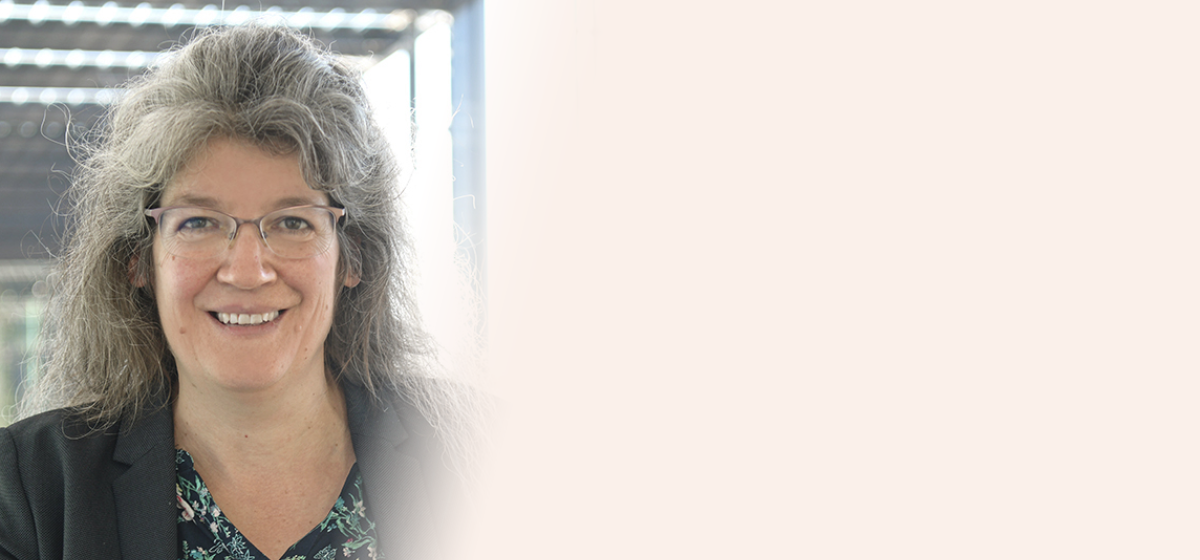
Cooperation with Other Disciplines
Who are you in two sentences?
I am Anita Schöbel, professor for Applied Mathematics and director of the Fraunhofer Institute for Industrial Mathematics (ITWM). Besides I am an enthusiast promoting mathematics for solving problems that are real and matter.
In which field of mathematics do you work and how long have you been working there?
I am working in the field of optimization, mostly in discrete, multi-objective, and robust optimization. I love applications and have been studying optimization of public transport for more than 20 years. This requires not only sound knowledge of mathematical optimization but also of the application domain.
What is the most important problem in your field that MaRDI aims to solve?
Bringing together different disciplines which is only possible if we speak the same (scientific) language, use the same ontologies and are able to interchange data.
What's your expertise within MaRDI?
I provide case studies and many years of experience with interdisciplinary work including classification of models and data between disciplines.
How do you wish the data culture to change with the help of MaRDI?
That's an easy question: the data culture should be FAIR. I also hope that MaRDI contributes to the aim that working with data, providing datasets and classifying and transforming data will be higher valued by the research community.
How would you describe a typical work day?
Meeting, meeting, meeting, maybe lecture, meeting, meeting, meeting. And during all the day e-mails are floating into my mailbox happily waiting for me to answer them.
What is an aspect of your work that you particularly enjoy and what is one that you find challenging?
I greatly enjoy contributing to the impact, mathematics does have in the real world. I also enjoy working together with many very engaged researchers. It is a challenge to find time for everything I would like to do.
January 31, 2023; Photo: © Fraunhofer ITWM
TA4: Cooperation with Other Disciplines
Fraunhofer Institute for Industrial Mathematics (ITWM), Kaiserslautern
anita.schoebel@itwm.fraunhofer.de
Do you have a favorite place you go to for thinking about a problem?
Sure! The Palatinate forest.
What do you enjoy outside work?
Meeting family and friends, hiking, biking, nice restaurants, and certainly (Palatinate) wine.
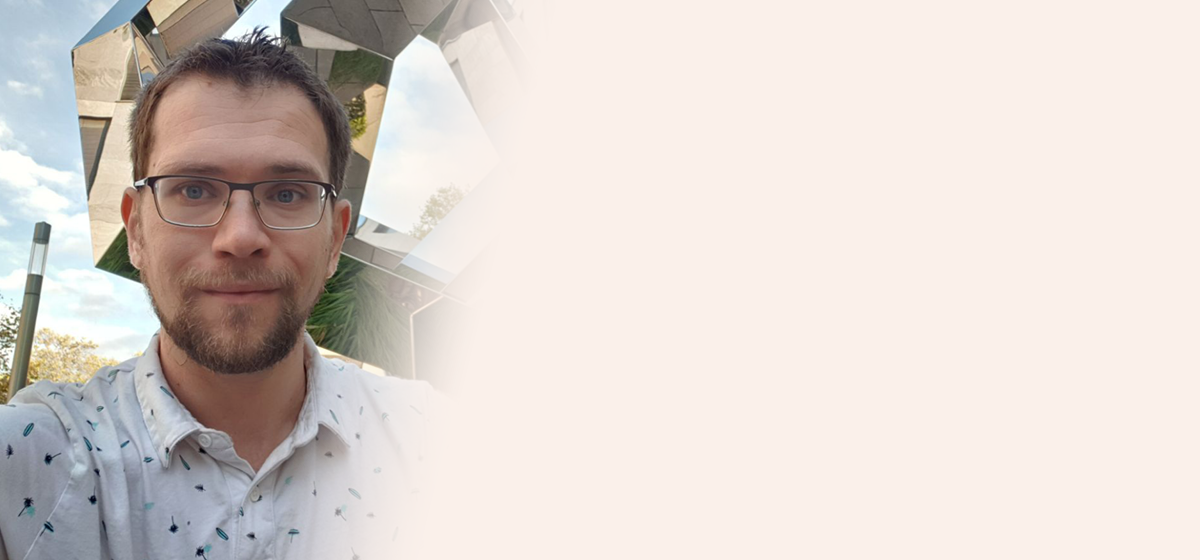
The MaRDI Portal
Who are you in two sentences?
I'm Johannes Stegmüller, I am a researcher and software developer with a technical computer science background. My journey brought me from creating devices on the hardware level to working on something which takes place mostly in the web.
In which field in MaRDI do you work, and how long have you been working there?
I'm working on the MaRDI Portal since the beginning of 2022. My focus is the processing of formulas in the MediaWiki/Wikibase environment used on the Portal.
What is the most important problem in your field that MaRDI aims to solve?
Mathematical research data is distributed over various infrastructures and stored there in a silo-like fashion. The MaRDI Portal will be a central public endpoint for finding and accessing this distributed data.
What question can you answer best regarding MaRDI?
Questions regarding the database and search index creation of the formula search in MaRDI Portal. I'm currently gathering knowledge in the computer-aided processing of various formula notations.
How do you wish the data culture to change with the help of MaRDI?
I wish through MaRDI a fruitful collaboration can be established between the participating institutes. I wish the created infrastructure and measures to accomplish FAIR research data culture are still in use long after they were created.
How would you describe a typical work day?
First, I collect all possible relevant thoughts and ideas. Write them down in a digital document. To then structure and logically align them. I make my computer understand these writings and translate them into its own language. Transfer them to a global swarm of computation instances. Finally, somewhere comes a cryptic message that tests failing because the software deployment is missing a semicolon.
What is an aspect of your work that you particularly enjoy, and what is one that you find challenging?
I really enjoy learning in a new environment and to have a focus on creating open-source computer systems which are helping a vast user base. Not being a mathematician, it is a challenge to gain a profound understanding of some of the more complex formulas handled by the tools developed.
What are your ideas for MaRDI?
Creating a software which automatically produces a minimalistic written publication from arbitrary research (meta)data or software source code. This would enable to place a findable and citable record of the publication on most research data infrastructures.
January 19, 2023
TA5: The MaRDI Portal
FIZ Karlsruhe
johannes.stegmueller@fiz-karlsruhe.de
Do you have a favorite place you go to for thinking about a problem?
Any places that have a far sight, like towers, mountains etc.
What do you enjoy outside work?
Riding the bike, hitchhiking and editing audio. An early moment where I realized that math really makes a difference was the feasibility to create a spectrogram from an audio signal using the Fourier transform.

Computer Algebra
Who are you in two sentences?
I am an arithmetic geometer, which means I am interested in the area of mathematics where number theory and algebraic geometry intersect. For MaRDI I am responsible for trying to introduce some kind of software peer reviewing process for mathematical papers that contain software components.
In which field of mathematics do you work and how long have you been working there?
I studied Mathematics at the university of Utrecht after which I did my PhD at Ulm University. I’m currently working as a postdoc in Kaiserslautern. I specialize in algorithmic arithmetic geometry and besides doing research I’m also help out with developing the computer algebra package OSCAR.
What is the most important problem in your field that MaRDI aims to solve?
One very big issue in computer algebra in general is that writing software is mostly seen as an afterthought. The mathematical paper that gets published is the important thing and the software is just… there. This attitude causes a multitude of problems. Whenever a paper that contains a software component gets sent to a journal, the reviewers check the paper, but the code often gets ignored. But this is kind of ridiculous. You wouldn’t believe the statement of a theorem without a proof, so why would you blindly believe a result that is partially based on computations without checking the code?
There are also issues with proper acknowledgment and citations. It happens far too often that people reuse code without properly crediting the author. I also know of some very smart and talented mathematicians who chose to mostly work on developing computer algebra software, who were forced out of academia. They didn’t have enough publications, so they couldn’t get a job. But what they did definitely wasn’t trivial. It required a very deep knowledge of both mathematics and writing efficient low level C code. Writing this kind of software is far more difficult than writing a decent paper. But it simply doesn’t get acknowledged as such.
What's your expertise within MaRDI?
I’m involved in trying to improve the software peer reviewing process in MaRDI. For that I give talks about why it is important and I reach out to journals and conferences to try to develop standards that can be used in the future.
How do you wish the data culture to change with the help of MaRDI?
I hope that people will slowly start to see data and algorithms as vital parts of a publication. When people start treating software and data with more care and attention and also acknowledge the effort that goes into it, they will make more of an effort to make it available for peers to look at and reuse. Something which is important for the future of mathematics as a whole.
How would you describe a typical work day?
It really depends on the day. Some days I’m just sitting behind my computer the entire day programming to get some algorithms into OSCAR, other days I’m mostly reading papers and doing research.
I also spend time approaching editors and organizers of conferences to talk about implementing software peer reviewing. In the future I’m going to test out the ideas that we have and I’ll probably spend a lot of time reviewing software.
What is an aspect of your work that you particularly enjoy and what is one that you find challenging?
Research-wise I simply like learning new parts of mathematics and having a deeper understanding how everything is interconnected. I also always quite enjoy teaching (although I don’t always have teaching responsibilities).
One of the most challenging things is trying to get community acceptance of software peer reviewing. Most people who have worked with software before understand that it is necessary. But doing it properly means putting in extra work and that costs time. And there is so much pressure on researchers to keep publishing papers that there is simply not always enough time to handle the software components with care. There is also a bit of politics involved here. Because systems and storage solutions for the better treatment of software and data need to be put into place if we want to improve things, but that costs a lot of money.
January 03, 2023
TA1: Computer Algebra
Technische Universität Kaiserslautern
hanselman@mathematik.uni-kl.de
Do you have a favorite place you go to for thinking about a problem?
A bit of a boring answer, but I think I work best sitting behind my desk. Either in my office at the university or at home.
What do you enjoy outside work?
I enjoy ballroom dancing (Latin and standard), I like cooking, playing board games, playing video games, drawing and I also go hiking from time to time.
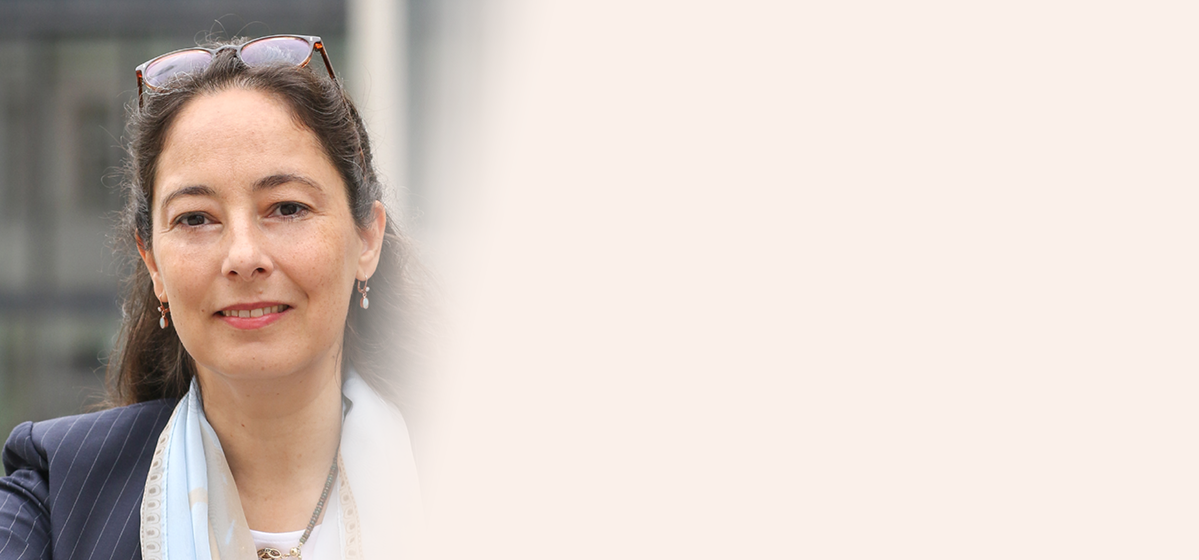
Data Culture and Community Integration
Who are you in two sentences?
After graduating in theoretical physics, I switched to pure math for good; and after spending many years in Berlin, I became a professor of differential geometry at Philipps-Universität Marburg in 2008. Right now, I am also president of the German Mathematical Society DMV (Deutsche Mathematiker-Vereinigung), a really challenging and exciting (side) job!
In which field of mathematics do you work and how long have you been working there?
When I was in my third semester, I fell mathematically in love: I attended a summer school on Lie groups and representation theory, and I thought: Yes, this is what I want to do for the rest of my mathematical life. Just as in real life, it didn’t turn out exactly like that, but it’s coming close: Since many years, I am using Lie theory successfully for solving problems in differential geometry. My research deals with the interplay between solutions to geometric differential equations like the Dirac equation, the holonomy theory of connections, and manifolds with additional structure, like certain curvature conditions or the existence of a compatible almost hermitian structure. Symmetries are everywhere and Lie groups are the means to describe them!
What is the most important problem in your field that MaRDI aims to solve?
Lie theory and its applications to differential geometry can be very computational - but we, as a community, are not data specialists. I hope that MaRDI will help in professionalizing the documentation of our findings. From Spring 2023, I will be dealing with another challenge: Our project Math4VIP (= Visually Impaired People) was approved a few weeks ago by the VolkswagenStiftung. The goal of the Math4VIP project is to create a central platform that provides information about and access to mathematics and how mathematical content should be prepared for students with visual impairment. In this process, new standards will be developed, materials will be created according to these standards, guidelines will be written and publicized through appropriate outreach. In this way, students with visual impairment have access to barrier-free materials, regardless of the university at which they study. Some of this sounds familiar, doesn’t it?
What's your expertise within MaRDI?
I’m afraid my expertise is less on the technical side - my role in MaRDI as DMV president is to act as a link to the mathematical community as a whole, to make contacts and bring together lose ends.
How do you wish the data culture to change with the help of MaRDI?
It should become second nature to all mathematicians to implement and adhere to a data culture adapted to their research area in their daily work.
How would you describe a typical work day?
It starts as it ends - with reading and replying to dozens of emails (happily, my „digital secretary“ is doing a good job - supported by some AI hidden in the software). In between, I give lectures, I work with my students and collaborators, and I deal with the infinitely many aspects of university administration. All in all, the days are way too short.
What is an aspect of your work that you particularly enjoy and what is one that you find challenging?
I appreciate very much working with and meeting people from many different countries. I do believe that scientific exchange is a contribution to international understanding, for which there is the beautiful German word „Völkerverständigung“. I also enjoy the freedom that our profession gives to us (sometimes, we forget about it). What I find very challenging is the increasing heterogeneity of the student community and the many blanks they have when entering university.
December 20, 2022; Photo: © Thomas Richter
TA6: Data Culture and Community Integration
Philipps-Universität Marburg
agricola@mathematik.uni-marburg.de
Do you have a favorite place you go to for thinking about a problem?
Conferences and seminars! When I listen to other people talking about math, my mathematical brain speeds up automatically, whether the topic is interesting or not. I get new ideas, I take lots of notes, and sometimes, I do a calculation or some reading on the side.
What do you enjoy outside work?
Singing, reading, and travelling. I am a tenor in a Marburg choire, I read dozens of books every year (Robert Harris is one of my favourite authors), and I am REALLY looking forward to a trip to the Falkland Islands that my partner and I will do over Christmas and New Year! Let’s see how penguins and sea lions will celebrate this…
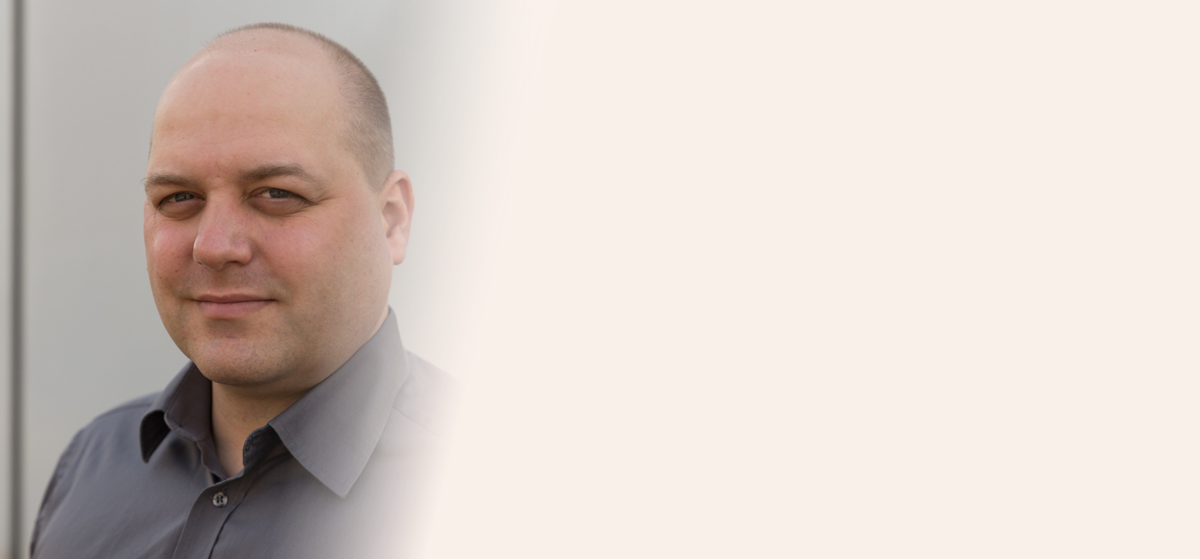
Scientific Computing
Who are you in two sentences?
I am an applied mathematician with an unavailability-of-computer-based-experiments pet-peeve. I work in the scientific computing task area of MaRDI (TA2), in particular on a knowledge graph of numerical algorithms.
In which field of mathematics do you work and how long have you been working there?
For over a decade my research field is model order reduction, specifically system-theoretic model reduction, where I worked on combined state and parameter reduction of brain networks and parametric model order reduction of gas networks. The overarching numerical theme in these settings is that a discretized mathematical model of a natural or technical process, such as information propagation in the brain or gas transport in a pipeline network, becomes so high-dimensional that numerical computations are too slow for practical use or even infeasible. Model reduction counteracts this curse of dimensionality by algorithmically simplifying models while retaining their relevant features.
What is the most important problem in your field that MaRDI aims to solve?
Numerical algorithms are working behind the scenes in all aspects of our daily life, and are the foundational layer to most, if not all, other sciences using computers. In my humble opinion, this means numerical research results need to be held to the highest standard in terms of scientificity, in order to prevent, to the best of our abilities, propagated problems down the line. And this standard is FAIR - Findable, Accessible, Interoperable, Reusable - research, which MaRDI aims to implement.
What question can you answer best regarding MaRDI/ What's your expertise within MaRDI?
Already before MaRDI, colleagues and I have worked on how to make computer-based experiments, numerical experiments and numerical software replicable, reproducible and reusable as well as sustainable in their development. This also plays a role in my current position within MaRDI, but predominantly I am working on the "F" in FAIR: making numerical algorithms findable via a knowledge graph.
How do you wish the data culture to change with the help of MaRDI?
My first and foremost wish would be that source codes, data sets, etc., defining any computer-based scientific result become available by default. I cannot comprehend why this has not been the standard right from the start: Technically, these digital artifacts are seamlessly duplicable, and storage is in almost all cases not an issue.
What is an aspect of your work that you particularly enjoy and what is one that you find challenging?
Building a knowledge graph involves a lot of classification and thinking about the properties and interrelations of those classes. This can be rewarding in the sense that new connections or similarities between topics appear. On the other hand, it is challenging to look at the backlog of decades of numerical research that is not classified, not digitized, or not even available, all while daily lots of new research is published.
This interview is from July 2022, Christan Himpe is no longer working for MaRDI at the time of publication.
TA2: Scientific Computing
Universitäts- und Landesbibliothek
Westfälische Wilhelms-Universität, Münster
Do you have a favorite place you go to for thinking about a problem?
Not really, I just need undisturbed time and headphones with the right music.
What do you enjoy outside work?
Playing saxophone in a jazz combo.
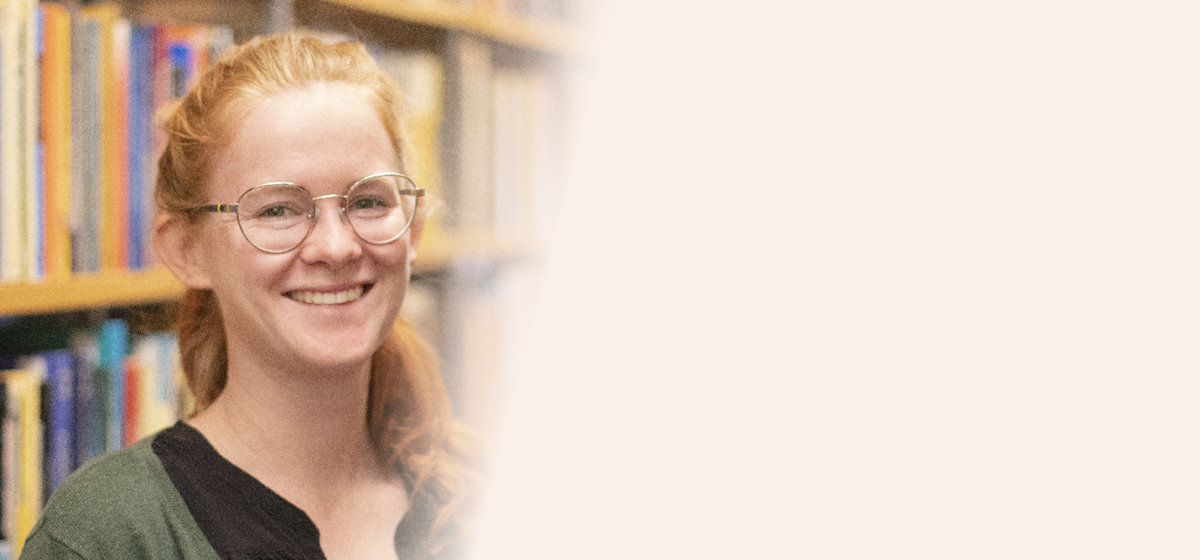
Data Culture and Community Integration
Who are you in two sentences?
I am a trained mathematician, I really enjoy bringing people together and I like to organize events. I am happy to combine these in my job as MaRDI's Dissemination Coordinator.
In which field of mathematics do you work and how long have you been working there?
I studied mathematics at the University of Leipzig, where I specialized in functional analysis and wrote my diploma thesis in ergodic theory. Since working for MaRDI at the Max Planck Institute in Leipzig, I have been more engaged in algebraic statistics and am involved in a research project in this area.
What is the most important problem in your field that MaRDI aims to solve?
Since I am quite new to mathematical research, so I am sharing from this point of view. I know the feeling of being overwhelmed by all the material I can look at and try out. This applies to books and papers as well as software and code snippets I don't understand exactly what they do. If these things are provided with good metadata and instructions it will be easier, not only for newbies like me, to get into research and not spend too much time on the on tinkering around. For example, I'm busy right now getting a piece of software up and running.
What question can you answer best regarding MaRDI?
As MaRDI's Dissemination Coordinator I am up to date with everything that happens in MaRDI disseminationwise. In particular which and what sort MaRDI events and actions are planned, what's happening in each task area.
How do you wish the data culture to change with the help of MaRDI?
In an ideal world every mathematician would have heard about the FAIR principles and would have access to knowledge and infrastructure to follow these. It would be natural to publish all data associated with a paper and also research data for example software would be recognized as a scientific achievement by itself. By rising awareness, creating a central portal, offering workshops and engaging in technical peer review MaRDI can help with these changes.
How would you describe a typical work day?
My job is very multifaceted. I have organizational and administrative tasks. I plan events and have conversations and meetings with people inside and outside MaRDI, including libraries, which are also a target group of MaRDI.
To experience the handling of mathematical research data first hand, I am involved in a research project in algebraic statistics. In this project we create a database of mathematical objects, namely Conditional Independence Structures.
I also travel frequently, both to MaRDI workshops and to other events at which I represent MaRDI.
What is an aspect of your work that you particularly enjoy and what is one that you find challenging?
I enjoy learning so many new things during my work, as I come in contact with many different areas and people in mathematics. In addition, it is exciting to accompany a project in its initial phase, in which all the structures are only just being created.
I find it challenging to get people excited about research-data management and to show them that it is worthwhile doing, even if it requires a lot more work at first.
November 22, 2022
TA6: Data Culture and Community Integration
Max Planck Institute for Mathematics in the Sciences (MPI MIS), Leipzig
+49 341 9959705
bacher@mardi4nfdi.de
Do you have a favorite place you go to for thinking about a problem?
The best way for me to think is to go for a walk. The parks in and the forests around Leipzig are ideal for doing so.
What do you enjoy outside work?
I like to organize events in my free time, too; ranging from Acroyoga festivals to board game nights. And I like to work with my hands: gardening, pottery, cooking, ...
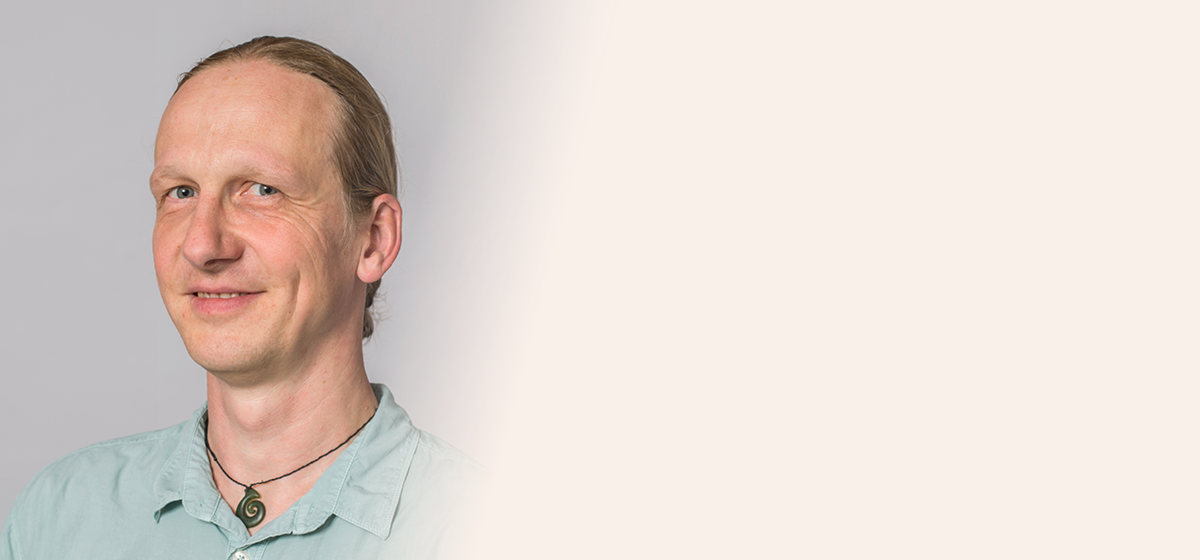
Governance and Consortium Management
Who are you in two sentences?
I am a physicist by training and a scientist at heart. I guess I have some capabilities in analysing things and in working with people.
In which field of mathematics do you work and how long have you been working there?
Most of my work is interdisciplinary in nature; at the bridge between statistics und biomedical sciences.
What is the most important problem in your field that MaRDI aims to solve?
Data from the biomedical sciences is usually well-organized and described, and is nearly fully FAIR. However, as somebody who develops methods, I often struggle to transfer the knowledge about this data that would allow me to develop appropriate methods for data handling. I would like to see MaRDI make this process easier including the access to the available methodologies.
What question can you answer best regarding MaRDI/ What's your expertise within MaRDI?
Together with Thomas (Koprucki), we had the early concept for MaRDI, when there was not even the notion of NFDI. So, I think and hope, that I can and will contribute to the conceptual development of MaRDI as a whole.
How do you wish the data culture to change with the help of MaRDI?
Data is our treasure and source of knowledge. So I would like to see this treasure to be lifted and the researcher who provides it, to give the appropriate credits.
How would you describe a typical work day?
I usually start checking emails (which is almost always a bad idea but keeps me aware of the things ahead), I take a walk or a ride by bike (to office) and start with my bullet journal to do the morning reflection (If I drop this, I know, this will be one of these days...). I am in a lot of meetings with different people on different topics. In between I try to work on a paper or some other content. I usually need a break in the late afternoon before continuing. I often do some planning for new things or just clearing the leftovers in the evening.
What is an aspect of your work that you particularly enjoy and what is one that you find challenging?
I like to learn new things from all areas of science, to combine knowledge on a path to ... my tiny bit of wisdom. I find it challenging, that teams always struggle to define their processes of working.
November 08, 2022; Photo: © Verena Brandt
TA7: Governance and Consortium Management
TA4: Cooperation with Other Disciplines
TA3: Statistics and Machine Learning
Weierstrass Institute for Applied Analysis and Stochastics (WIAS), Berlin
+49 30 20372564
karsten.tabelow@mardi4nfdi.de
Do you have a favorite place you go to for thinking about a problem?
When I am on route, either by bike or on foot.
What do you enjoy outside work?
I like to play the piano and to sing, I like hiking in the mountains, cooking and eating. I also like to think about politics and all disciplines of science.